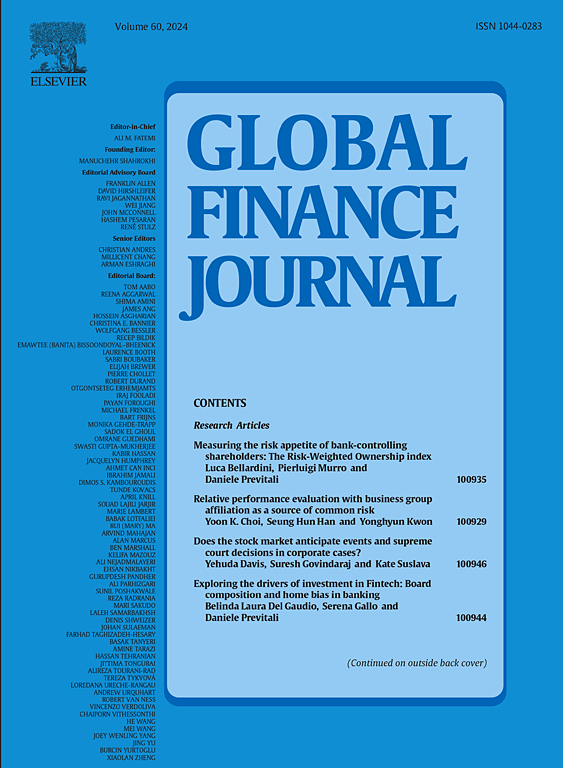ESG评级分歧与权益资本成本
IF 5.5
2区 经济学
Q1 BUSINESS, FINANCE
引用次数: 0
摘要
围绕企业环境、社会、支配结构(ESG)评级的争议日益引起投资者的关注,并成为学术研究的焦点。针对ESG评级差异对权益资本成本的影响,本文提出了两个相互竞争的假设:信心渠道假设和信息渠道假设。本文以2015 - 2023年沪深两市a股上市公司数据为研究样本,实证考察了ESG评级差异对股权资本成本的影响及其机制。研究结果表明,ESG评级分歧增加了企业的权益资本成本,这一关系通过广泛的稳健性测试得到了证实。机制分析表明,ESG评级分歧通过削弱投资者信心(信心渠道)提高了权益资本成本,而没有证据支持它通过减少信息不对称(信息渠道)来降低权益资本成本的观点。进一步分析表明,在重污染行业,ESG评级差异对权益资本成本的不利影响更为明显。然而,机构投资者的实地考察和分析师的报道可以缓解ESG评级分歧对股权资本成本的负面影响。本文章由计算机程序翻译,如有差异,请以英文原文为准。
ESG rating disagreement and the cost of equity capital
The growing controversy surrounding corporate environmental, social, and governance (ESG) ratings is increasingly drawing the attention of investors and becoming a focal point in academic research. This paper advances two competing hypotheses concerning the impact of ESG rating disagreement on the cost of equity capital: the confidence channel hypothesis and the information channel hypothesis. Utilizing data from Chinese A-share listed companies on the Shanghai and Shenzhen stock exchanges from 2015 to 2023 as our research sample, this study empirically investigates the effect of ESG rating disagreement on the cost of equity capital and its underlying mechanisms. The findings reveal that ESG rating disagreement increases firms' cost of equity capital, a relationship confirmed through extensive robustness tests. Mechanism analysis indicates that ESG rating disagreement elevates the cost of equity capital by undermining investor confidence (the confidence channel), while there is no evidence to support the notion that it reduces the cost of equity capital by decreasing information asymmetry (the information channel). Further analysis demonstrates that in heavily polluting industries, the adverse impact of ESG rating disagreement on the cost of equity capital is more pronounced. However, institutional investors' site visits and analyst coverage can alleviate the negative effects of ESG rating disagreement on the cost of equity capital.
求助全文
通过发布文献求助,成功后即可免费获取论文全文。
去求助
来源期刊

Global Finance Journal
BUSINESS, FINANCE-
CiteScore
7.30
自引率
13.50%
发文量
106
审稿时长
53 days
期刊介绍:
Global Finance Journal provides a forum for the exchange of ideas and techniques among academicians and practitioners and, thereby, advances applied research in global financial management. Global Finance Journal publishes original, creative, scholarly research that integrates theory and practice and addresses a readership in both business and academia. Articles reflecting pragmatic research are sought in areas such as financial management, investment, banking and financial services, accounting, and taxation. Global Finance Journal welcomes contributions from scholars in both the business and academic community and encourages collaborative research from this broad base worldwide.
 求助内容:
求助内容: 应助结果提醒方式:
应助结果提醒方式:


